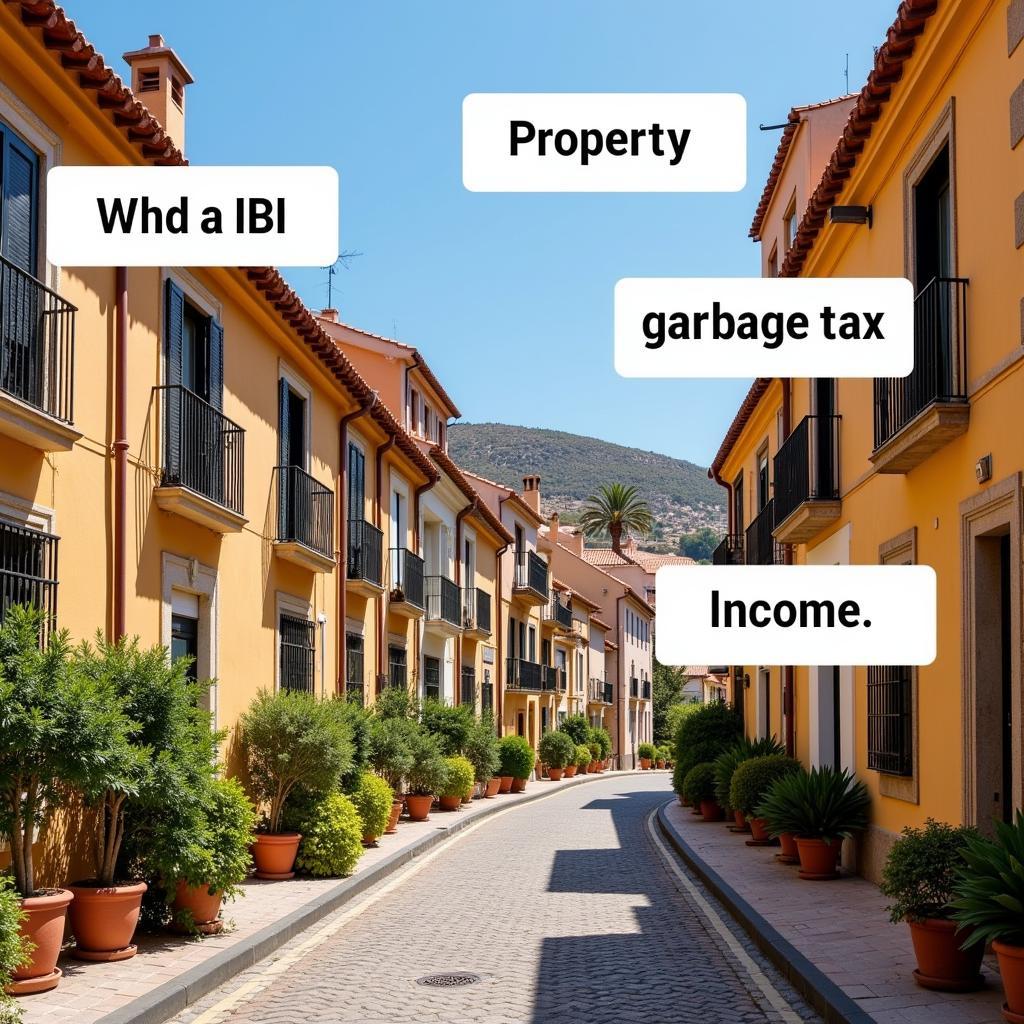Purchasing a home in Spain is an exciting venture, whether you’re drawn to the vibrant culture, sunny beaches, or the prospect of a more relaxed lifestyle. However, navigating the intricacies of property taxes in a foreign country can seem daunting. Fear not, this comprehensive guide will walk you through the different types of Taxes On A Home in Spain, empowering you to make informed decisions on your Spanish property journey.
Understanding Property Taxes in Spain
As a homeowner in Spain, you’ll encounter several recurring property taxes. These taxes contribute to local services and infrastructure, ensuring a comfortable living experience. Let’s break down the key taxes you need to be aware of:
IBI (Impuesto sobre Bienes Inmuebles) – Property Tax
IBI is the Spanish equivalent of council tax, levied annually on all property owners. The amount you pay is calculated based on the valor catastral, which is the rateable value of your property determined by the local town hall.
Factors influencing valor catastral:
- Location of your property
- Size and age of the property
- Local amenities and infrastructure
Paying your IBI:
- Payment methods and deadlines vary depending on your municipality
- Many town halls offer direct debit options for convenient payment
- Failure to pay IBI on time can lead to penalties and interest charges
Garbage Tax (Tasa de Basura)
As the name suggests, this tax covers the cost of garbage collection and street cleaning in your municipality. The garbage tax is typically paid annually and is based on the valor catastral of your property.
Non-Resident Income Tax (IRNR)
If you’re a non-resident homeowner in Spain, you’ll need to pay income tax on any rental income you receive from your property. This tax also applies even if you don’t rent out your property and it remains vacant. The standard rate for non-resident income tax is currently 19% of the net rental income.
Taxes When Buying a Property in Spain
Besides recurring taxes, you’ll encounter some one-time taxes during the property purchase process:
Transfer Tax (ITP) for Resale Properties
When buying a resale property in Spain, you’ll be liable for Transfer Tax, which varies depending on the autonomous community where your property is located. Generally, the ITP rate ranges from 6% to 10% of the purchase price.
VAT (IVA) for New Build Properties
New build properties in Spain are subject to VAT instead of Transfer Tax. The current VAT rate for new homes is 10% of the purchase price.
Stamp Duty (AJD)
In addition to VAT, new build properties are also subject to Stamp Duty, which varies depending on the autonomous community. AJD is typically between 0.5% and 1.5% of the purchase price.
Legal Fees and Other Expenses
It’s important to factor in legal fees, notary fees, and land registry fees, which are typically around 1% to 2% of the purchase price.
 Understanding Spanish Property Taxes
Understanding Spanish Property Taxes
Taxes When Selling a Property in Spain
Selling your Spanish property also comes with its own set of taxes:
Capital Gains Tax (CGT)
When you sell your property for a profit, you’ll be subject to Capital Gains Tax. This tax applies to the difference between the purchase price and the selling price. However, non-residents can benefit from a tax deduction on the capital gains if they reinvest the sale proceeds in another property within the European Union.
Plusvalía Tax
This tax applies to the increase in the value of the land your property is built on since the previous sale. The Plusvalía is calculated based on a complex formula that considers the valor catastral, the number of years you’ve owned the property, and the tax rates set by your local municipality.
 Navigating Taxes When Selling Your Spanish Home
Navigating Taxes When Selling Your Spanish Home
Tips for Managing Your Property Taxes in Spain
- Seek Professional Advice: Consulting with a qualified tax advisor or lawyer specializing in Spanish property law is crucial for understanding your tax obligations and optimizing your tax liability.
- Keep Meticulous Records: Maintain detailed records of all property-related expenses, including purchase documents, renovation invoices, and tax payment receipts.
- Understand Local Regulations: Tax laws and regulations can vary significantly between different regions and municipalities in Spain. Familiarize yourself with the specific rules applicable to your property’s location.
- Consider Tax Residency: If you spend a significant amount of time in Spain, you may be considered a tax resident, which affects your tax obligations.
- Explore Potential Exemptions and Deductions: Spain offers various tax exemptions and deductions for homeowners, such as those for renovations aimed at improving energy efficiency.
Conclusion
Understanding the taxes on a home in Spain is essential for anyone considering buying or selling property in this beautiful country. By familiarizing yourself with the different taxes and seeking expert advice, you can navigate the process with confidence and enjoy the many benefits of owning a piece of Spanish paradise.
Ready to find your dream home in Spain? Browse our selection of Mallorca homes, ocean home Isla Canela, Bel Air home or explore our Almeria homes to buy and holiday homes Fuerteventura.